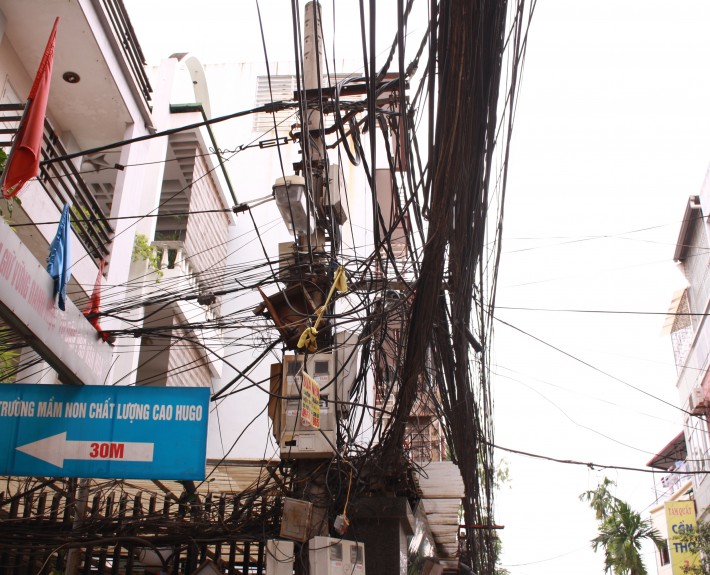Vietnamese Work Culture
If you are coming to work in Vietnam from the west then it might take some time to get used to the Vietnamese way of doing things, which can be effective in its own way (it works here after all) but can also be off-putting to some people and bewildering to others. The work culture here is a mixture of indirect communication, posturing, a heavy top-down management style, and (for some workers) a “good enough” mentality when it comes to performance. Needless to say, it can be challenging to communicate your vision for how something should be done based on a client’s or your requirements.
Vietnamese workers have different professional needs than workers in the west—both in the office and on site so you might have to employ different communication techniques and different ways to motivate them in order leverage their strengths once you begin to understand how to effectively communicate with local workers. If an option, starting a new worker on a smaller project and then gradually expanding his/her scope is a good way to build his/her confidence while minimizing organizational risk. Whatever it is that you expect of a worker here, you should be able to simplify the process as much as possible or should have even attempted the process yourself beforehand to know what the pitfalls are for workers. Perceptions of good design, aesthetics, and fashion are very different here from the west—explore these arts with an open mind but be aware of the limitations in terms of technology, skill level, and approved content.
Vietnamese are generally not geared toward being creative (in part, due to the educational system of learning and for fear of losing face) when it comes to work tasks so they can experience some trouble coming up with new ways to improve processes or in creative fields such as design. Being creative may simply be too risky for them since it requires thinking about concepts, products, services, etc. in a way that hasn’t been thought of before—and it lessens the chance of success since no one has done it that new way before. Similarly, for Vietnamese workers to imagine something being done a new way via your explanation might be hard for them. Therefore, Vietnamese workers seem to fall back on “tried-and-true” ways to solve problems—which doesn’t always scale well and may be counterproductive in some cases if a step in the process has to be redone due to different (international) requirements.
However, Vietnamese are generally good at copying things, i.e., if you show them exactly how you want something done in terms of a process and the finished result then that will increase the chances of your satisfaction for the product or task end result. This method can be helpful in batch manufacturing or for installations in construction. Vietnamese workers are also able to skillfully digitally recreate and combine graphic art as a base for future modification for whatever project you might be working on but they will require guidance and input from you. (Note: If you are hiring locals then they might leave to form their own company once you train them. There’s no way you can compete with them on wages because they will have a much lower cost of living than you do.)
Coming from the west, you might notice a lot of inefficiencies in your first week or month or year in your local organization but it would be wise to refrain from actively trying to change things until you’ve proven yourself to your local colleagues and built up some goodwill. A possible first step in the right direction might be to push upper management for the dismissal of underperforming teammates especially if it’s necessary to shape a better organizational culture/fit ( however, it can be hard to fire workers due to labor laws and/or relationships).
Managing Vietnamese Workers
If you are a manager in a Vietnamese company, then try to get to know your direct reporting team as much as possible. Go to café outings as a team (the male coworkers will probably be willing to go for beers but the female coworkers generally won’t) and participate in other semi-professional bonding experiences. As long as your team performs to an acceptable level (to those you report to), and your client or manager is happy then there really isn’t a need to change much except for the professional growth of your team.
At first, it might be hard to find out the strengths and weaknesses of your team because Vietnamese are generally shy and don’t naturally “sell” themselves. One of the biggest problems here is with lack of confidence: both with confidence in their abilities to succeed and in their confidence to ask clarifying questions without looking stupid (so assumptions are made and things are shoved forward at times). Don’t be surprised if you get lame responses for why something is late or wasn’t done as asked. Patience and polite firmness (“I’m sorry but I can’t allow or do that.”) are the only ways to be effective in those situations. Your top talent on the team might be the most reserved and you’ll have loudmouths who will talk and obfuscate their way to the top if you allow them to. Figuring out who is the real deal and who is just puffing his/her chest will take some time to figure out. Don’t underestimate or write off someone here based on a first impression; once you get to know them then you will be able to discern if they are competent or if they are a liability. It could be that with the right training, a good worker can become a great one.
Great workers can be hard to find because there is generally not much appreciation for the consequences of doing something one particular way versus another. The path taken by most workers here is usually the shortest and the one with the least resistance, especially in blue collar fields. This short-term focus can be incredibly frustrating at first because it requires addressing basic elements that you can take for granted elsewhere. For example, trade workers might show up to repair something in your home and then proceed to use your kitchen knives as their tools or your dish cloths as their rags to wipe down things (if they even clean up afterwards). They might even show up hungover or drunk as well so it could make for some interesting home repair experiences. The point here is that workers require more supervision than in the west (at least for the first time going through a process) or else you will find them using your butcher knife as a shovel, your steak knife to scrape paint off steps, and your paring knife to apply some chemical goo somewhere (yes those are all real examples but skill levels vary across local organizations).
Training Vietnamese Workers
That being stated, the best way to train workers here is through positive reinforcement, i.e., focusing on the things that are done right and minimizing the focus on negative aspects unless they are mission critical, e.g., “Do it more like the way that you previously did.” Any critical feedback should be done in private and praise should be given in public. Be cognizant of age differences between you and your counterpart because if you are younger than him/her then it could result in some awkward disagreements, especially if you feel that s/he is wrong (elders are usually given authority) and vice versa. The best way to move forward in situations like those is to focus on consistent future performance and try to get everyone on board in a harmonious way. Eventually, once you bond with your teammates, you will find that they will smile more, laugh more, and may even touch your arms or shoulders more when communicating with you. Some workers may be more affectionate than others but it’s just a way of showing you are one of them especially if there are language barriers. Regardless, one thing is guaranteed: they will all nap so it might be wise to change training schedules to meet those napping needs. Napping is part of daily life here during lunchtime; the workers will either fall asleep at their desks or find a beanbag or other comfortable surface (or will even end up on the floor). As they say, “don’t knock it until you try it.”
Future Vietnamese Workforce Potential
So while the Vietnamese workforce definitely has room to improve and grow, the trend in recent years is positive because the youth here are simply great. They are bright, optimistic for the future, talented, eager to learn, and focused on improving their socio-economic conditions. It might be this current generation that can unlock the full potential of Vietnam’s human capital resources. Those who study abroad are bringing back a different mindset for problem solving to share with the local organizations here and are actively involved in helping other students who haven’t had similar opportunities. The youth are interested in working with and learning new techniques, best practices, and new skills from foreigners and are, more importantly, generally honest about the challenges ahead for today’s Vietnam.
While it won’t be easy working with locals, and projects might take longer than you originally thought, and you might have to do more than your “fair share” of responsibilities to get something done the right way… with the right team, the right attitude, and the right training anything is possible in Vietnam. And soon enough with new technologies, new skills, and new attitudes that are being adopted on a daily basis, everything will be possible in Vietnam.













